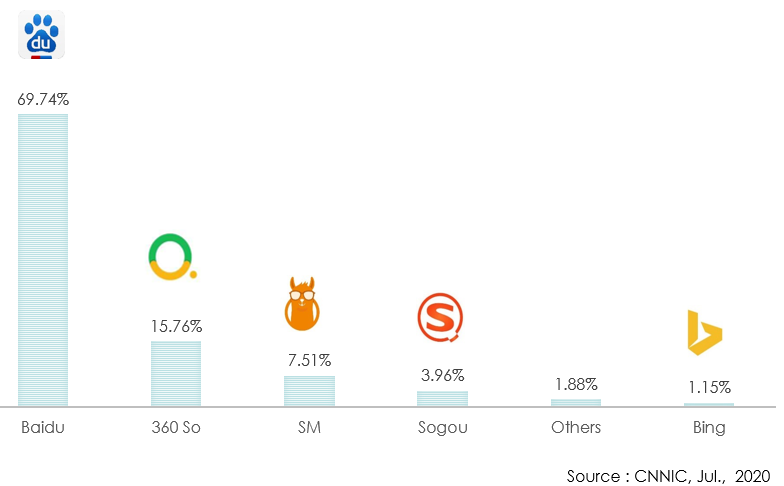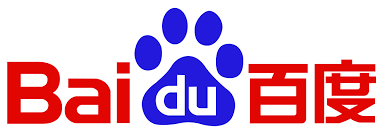There are 2 major classifications of China search engines: Simplified and Traditional which are based on different dialects of the Chinese language. In mainland China, we use Simplified Chinese language search engines.
China Major Search Engines with The Market Share

The market leader is Baidu with nearly 70.58% of total search market, followed by 360So with 12.51% market share. However these %’s may not reflect the chosen target platforms and aims for an online campaign.
The tables below show how Chinese readers have wide diversity of preferred search engines with levels of education and location.
For example: note how Masters level educated readers will use Google China for nearly half of their search requirements, yet for high school or less educated users will use Google China for only 10% of their search. Search must be targeted to the right platforms and locations, and spending depends on accounting for your branding and sales requirements.
Introduction of Major Search Engines in China

Baidu, Inc. (Baidu), incorporated on January 18, 2000, is a Chinese search engine for websites, audio files, and images. Baidu offers 57 search and community services including Baidu Baike, an online collaboratively-built encyclopedia, and a searchable keyword-based discussion forum. In October 2008, Baidu ranked 9th overall in Alexa’s internet rankings. Baidu offers a number of services to locate information, products and services using Chinese-language search terms, such as, search by Chinese phonetics, advanced search, snapshots, spell checker, stock quotes, news, knows, postbar, images, video and space information, and weather, train and flight schedules and other local information. The user-agent string of Baidu search engine is baiduspider.

Google China, founded in 2005, is the subsidiary of Google, Inc., the world’s largest Internet search engine company, in the People’s Republic of China’s mainland. The competitors of Google China include Baidu.com, often called the “Google of China” due to its resemblance and similarity to Google. In August 2008, Google China launched a legal music download service, Google Music, to rival Baidu’s potentially illicit offering.
Since announcing its intent to comply with Internet censorship laws in the People’s Republic of China, Google China has been the focus of controversy over what critics view as capitulation to the “Golden Shield Project” (also known as the Great Firewall of China). Because of its self-imposed censorship, whenever people search for interdicted Chinese keywords on a blocked list maintained by the PRC government, google.cn will display the following at the bottom of the page (translated): In accordance with local laws, regulations and policies, part of the search result is not shown. Some searches, such as (as of June 2009) “Tank Man” are blocked entirely, with the only the message “Search results may not comply with the relevant laws, regulations and policy, can not be displayed” appearing.

Qihoo 360, full name Qihoo 360 Technology Co. Ltd., is a Chinese internet security company known for its antivirus software (360 Safeguard, 360 Mobile Safe), Web Browser (360 Browsers), and Mobile Application Store (360 Mobile Assistant). It was founded by Zhou Hongyi and Qi Xiangdong in June 2005. Qihoo 360 had 496 million users for its Internet Security products and 641 million users for its Mobile Antivirus products as of June 2014.

Sogou is a Chinese search engine which can search text, images, music, and maps. It was launched 4 August 2004 and is owned by Sohu, Inc., SoGou means “Search Dog” in Chinese. As of August 2008, it has a rank of 184 in Alexa’s internet rankings. Sogou provides an index of up to 10 billion web pages.
